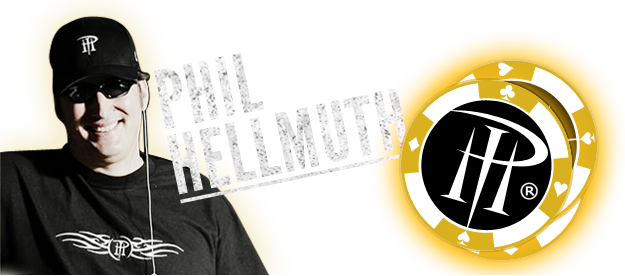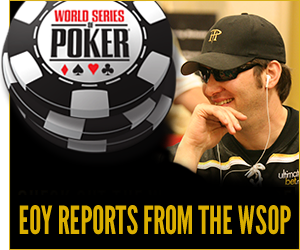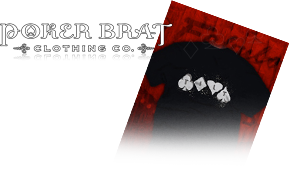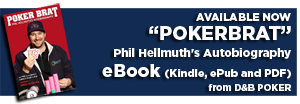-
Hearing the Smooth Call
In the 1996 World Series of Poker, I was watching my friend John Bonetti play a monster pot against the previous champion Dan Harrington. With only 26 players left in the championship and a $1 million prize up for grabs, Dan raised the bid up to $16,000 to go with Ks-10s, and Bonetti “smooth called” with his A-A.
The “smooth call” tactic refers to when you bid on a strong hand as if it were a mediocre one (calling opponents bets when standard theory says you should be raising them) in order to trick your opponent into thinking your hand is weak, enticing them to bet more.
Smooth calling entails a dangerous risk/reward scenario. By attempting to trap your opponents into betting more on hands they wouldn’t have otherwise, you also leave open the possibility that your competition might hit a lucky card and win.
-
A Tale of the False Tell
In October 2000, during a hand in the Taj Mahal Casino’s No Limit Hold’em Championship, I was dealt a pair of fours. With the blinds at $100-$200, four players, including me, called the bet.
With a flop of Qh-4s-2d in the community cards, I checked with my nearly unbeatable hand, two other players checked, and then Men “the Master” Nguyen bet out $600. I quickly decided to use my best false tell as I raised the pot up $1,200.
A “false tell” is a manufactured motion, movement, speech pattern, or simply the way you move the chips into the pot, which sends a subtle signal to your opponents that you are strong when you are weak, or weak when you are strong.
-
The Problem With Playing Too Aggressively
At a recent World Poker Tour championship in Tunica, Miss., 100 players were remaining (out of 540 who had bought in), when I witnessed a showdown between 2004 “Champion of the Year” Daniel Negreanu and 2003 “Champion of the Year” Chip Jett. With the blinds at $500-$1,000, the antes at $200 a man, Jett opened for $3,100 with Ah-8h, and Negreanu called with Kc-Qc. Then the deal got very interesting.
After a flop of Jd-5c-3c, Negreanu had a king-high flush draw and two overcards (cards that are higher than the ones on the board, in this case the king and queen). Jett studied the situation and counted his chips — he had $22,000 total. After a few moments, Jett moved all-in, and Negreanu replied: “I have to call you.” When the hands were flipped up, I thought, “Ugh, I hate Chip’s tactics here, what was he thinking?”
Knowing how a player typically reasons, Jett was probably thinking two things: -
When Instinct Should Outweigh Tradition
In January 2004, my wife and I jetted off to the land down under. The trip to Australia was primarily a vacation, but also coincided with a major poker tournament hosted by Melbourne’s Crown Casino (a five-star hotel that lives up to its billing). The “Australasian Championship” featured a $10,000 Aus dollar (about $7,200 U.S.) buy-in no-limit Hold’em final tournament that’s considered one of the most important events on the European Poker Tour.
About 130 players entered the three-day main event. After day one, I had about doubled up, and was in good stead. Late in day two, with 22 players remaining, I was in full-control of my table and running quite smoothly with $70,000 in chips when I faced a perplexing hand. With the blinds (required bets) at $1,000 and $2,000, and the antes at $300 a player, I opened for $6,500 with Ad-10d. I was called by a local player, and immediately thought that he had a pair somewhere between 10s and 2s, or A-Q. I read him for a strong hand because everyone at that table seemed to be afraid to play even a semi-strong hand against me.
-
How to Play Two Kings
Plenty of history and prestige were at stake at the World Poker Tour’s no-limit Hold’em Championship at the Bellagio in December 2004, not to mention a first-place prize of $1.8 million dollars. On the third day of the five-day marathon tournament, the following hand came up between Player X (an amateur) and me.
Everyone had been randomly reshuffled to new tables at the $15,000 buy-in event, with 45 players remaining (out of 400 entrants). With the blinds (required bets) at $3,000-$6,000 and a $500 a man ante, Player X (with $164,500 in chips) opened for $15,000 in the 7-seat, and, sitting in the 3-seat, I looked down at K-K (holding $285,000 in chips).
What to do? Although I loved having pocket kings, I couldn’t decide how to play them. Should I “smooth call” (underbid) the bet and hope to extract a lot of chips from my opponent later on in the hand? Or should I re-raise the bet before the flop and give the amateur a chance to re-raise me?
-
Finding Tells with Guts and Feel
On Super Bowl weekend in 2001, all of the players had been eliminated from the $5,000 buy-in World Poker Challenge’s Championship event except renowned player Mike Laing, with $200,000 in chips, and unknown Bill Eichel, who had $630,000 in chips. The two were locked in a one-on-one poker duel and the game was no-limit hold’em, where you can bet any amount at any time.
With 166 entries, first place in this event would pay $331,000; second place $166,000. Not bad for two days work at the Reno Hilton! Besides the money, a measure of history was at stake. This event figured to be one of the top-six “Prestigious Poker Events” of 2001. If it were pro golf, we would call it a “major.”
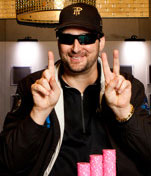
 ™
™



